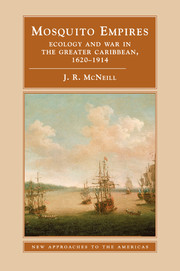Book contents
- Frontmatter
- Contents
- List of Maps
- List of Abbreviations Used in the Footnotes
- Preface
- Acknowledgments
- 1 The Argument (and Its Limits) in Brief
- PART I SETTING THE SCENE
- 2 Atlantic Empires and Caribbean Ecology
- 3 Deadly Fevers, Deadly Doctors
- PART II IMPERIAL MOSQUITOES
- PART III REVOLUTIONARY MOSQUITOES
- Bibliography
- Index
2 - Atlantic Empires and Caribbean Ecology
Published online by Cambridge University Press: 05 June 2012
- Frontmatter
- Contents
- List of Maps
- List of Abbreviations Used in the Footnotes
- Preface
- Acknowledgments
- 1 The Argument (and Its Limits) in Brief
- PART I SETTING THE SCENE
- 2 Atlantic Empires and Caribbean Ecology
- 3 Deadly Fevers, Deadly Doctors
- PART II IMPERIAL MOSQUITOES
- PART III REVOLUTIONARY MOSQUITOES
- Bibliography
- Index
Summary
In the way of Nature there can be no evil.
– Marcus Aurelius, The Communings with Himself of Marcus Aurelius Antonius (C. R. Haines, trans. Cambridge: Harvard University Press, 1987[1916])The Roman emperor Marcus Aurelius (121–180 a.d.) liked to take a stoic stance on most matters, and viewed human death with detachment. For the less detached among us, the yellow fever virus and its vector, the Aedes aegypti mosquito, might easily qualify as evil. Rarely, if ever, did they do as much mischief as in the West Indies between 1647 and 1900. Malaria and its vectors probably did less damage, but quite enough nonetheless. Mosquitoes and pathogens could not make history on their own: human actions set the stage.
This chapter aims to sketch the links between politics and warfare on the one hand and environmental change on the other, within the confines of the Caribbean basin of the seventeenth and early eighteenth century. It leaves for later consideration of the theme of environmental change in the southern colonies of British North America (Chapter 6). In the Caribbean, the creation of a plantation system featuring sugar above all other crops fueled an ecological and demographic transformation, making the region conform more fully to the preferences of mosquitoes and requirements of pathogens. It also helped raise the stakes of imperial geopolitics in the Atlantic world.
- Type
- Chapter
- Information
- Mosquito EmpiresEcology and War in the Greater Caribbean, 1620–1914, pp. 15 - 62Publisher: Cambridge University PressPrint publication year: 2010



